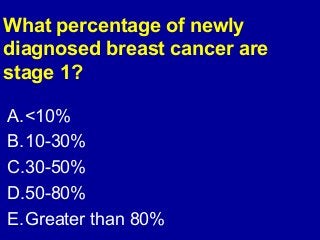
0830 1020 q&a ars breast cancer(update)
- 1. What percentage of newly diagnosed breast cancer are stage 1? A.<10% B.10-30% C.30-50% D.50-80% E.Greater than 80%
- 2. What percentage of newly diagnosed breast cancer are stage 3? A.<10% B.10-30% C.30-50% D.50-80% E.Greater than 80%
- 3. What percentage of newly diagnosed breast cancer are stage 4? A.<10% B.10-30% C.30-50% D.50-80% E.Greater than 80%
- 4. What percentage of newly diagnosed breast cancer are hormone receptor positive? A.<10% B.10-30% C.30-50% D.50-80% E.Greater than 80%
- 5. Treatment for locally advanced HR negative Breast Cancer • Neoadjuvant chemotherapy followed by surgery and then radiation • Surgery followed by chemotherapy and radiation in sequential fashion • Surgery followed by chemoradiation • Chemoradiation only • Other
- 6. Do you routinely check for Her2 neu positivity for all newly diagnosed breast cancer? • Yes • No
- 7. What percentage of newly diagnosed breast cancer are Her -2 Neu positive? A.<10% B.10-30% C.30-50% D.50-80% E.Greater than 80%